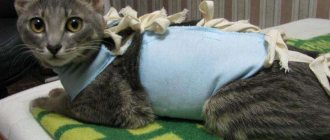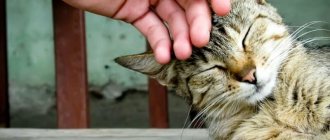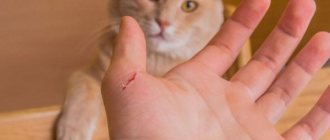The appearance of a furry baby in the house is a joyful event. But what if the kitten scratches or bites, leaving bleeding marks on its arms and legs? Some cat owners simply find this behavior of this charming little creature amusing. They specifically try to tease the pet so that they can play “fight” later. This is a big mistake.
Firstly, bites and scratches of even a small kitten are dangerous: they can cause infection, even serious forms. Secondly, before you know it, the young pet will turn into an adult cat. An aggressive cat in the house is a big problem, especially if there are children in the family. Therefore, you should not indulge your pet’s manifestations of anger, but rather correct his behavior from an early age.
Why does a small kitten bite and scratch?
There are several reasons why a baby may show claws and bite, and they are not always related to play.
Game or communication
The game is one of the likely reasons. If a small pet is bored, then it can choose the owner’s hands or feet as a play object, thus encouraging him to communicate. In this case, the solution is obvious: avoid contact with your hands, take a suitable toy and spend some time with your baby.
It's good if you can work out with him long enough for him to lose pent-up energy and get tired. After the game, treat him to something tasty, and most likely he will go to bed.
Aggression
A fluffy growing up at home may exhibit play aggression at the level of instinct. For this reason, the kitten often bites the hands and feet of the owner, following its innate characteristics. These are natural traits of the cat family, which manifest themselves even in an environment where the young creature does not have to hunt and get its own food by attacking the prey.
Sometimes aggression can be a manifestation of certain character traits in accordance with the breed or characteristics of growth and upbringing. Teenage kittens often get into a playful frenzy and seriously injure a person, simply forgetting themselves. In any case, the owner should think about options for weaning his pet from such games.
Illness or fright
It happens that a usually friendly and affectionate pet begins to show a bad character. In this case, you need to rule out possible health problems. Show your baby to the doctor and get the necessary tests.
It happens that the baby is simply tired and does not want to play - there is no need to disturb him, otherwise he may react with an outburst of anger. The same situation is possible if you accidentally hurt him, for example, by stepping on his tail.
In a situation where a pet is frightened by something (a sudden change in the situation, the appearance of an unfamiliar animal on the territory), it can instinctively use its teeth and claws. This is a defensive reaction. Try to calm the baby down.
The feeling of protection is very important for a cat. It’s good if he has his own house in which he can hide and feel safe.
Teething
Teething is another reason for uncontrolled biting. Kittens change their teeth between the ages of 3 and 5 months – it is at this time that they are the most biting. In such a situation, special toys with catnip, which can always be purchased at a pet store, will come in handy. The kitten bites them and thus scratches the itchy gums.
When to contact a veterinarian
Sometimes the owner is not able to accurately determine the reason why the cat behaves aggressively.
Be sure to read:
Why cats wash themselves often: 7 main reasons, what to do if they stop licking their fur
It’s time to go to the veterinarian in cases where the pet behaves strangely, constantly sits in one place and attacks if you approach it. Feeling unwell may be a sign of a serious illness.
Below is a table of the main diseases in cats:
| Sign | Cause |
| The cat sits still in one position, reacts aggressively to touch | Arthritis |
| Lying down, doesn’t want to move, won’t let you get close | Physical trauma |
| Falls over when walking, can crash into furniture, scratches and bites | Brain injury |
| Runs around the apartment, suddenly pounces and bites, meows loudly | Hormonal disbalance |
| Avoids bright light, tries to hide in a dark place, jumps on the owner, bites painfully, can attack at night, the animal has increased salivation | Rabies |
Cats also become aggressive during periods of sexual activity and increased levels of thiamine in the blood. In this case, the veterinarian will recommend medications and diet to eliminate the pet’s aggression.
How to stop a kitten from biting and scratching during play
Whatever the reason why the kitten scratches during play, the owner should think about how to wean the pet from dangerous games without harming the animal or causing even greater aggression and mistrust. Cats are known to be very touchy animals. And it is necessary to look for a more careful approach to kittens so as not to negatively affect their further development and worldview. There are several ways to stop a kitten from biting and scratching during play.
Switching attention
At an early age, kittens’ attention is very easy to shift to other, more interesting objects. Such objects can be rustling, rattling or glowing toys: rattles, balls, lumps of paper, bows on a string and other similar things. The furry baby will very quickly switch to a new game and stop biting your hands or feet.
If this option doesn't work, you can try audio distraction. As soon as the kitten begins to show aggression, you need to sharply and quickly say: “No” or “That’s enough” and loudly hit the table or any hard object. This should distract the pet’s attention and transfer it to the toy - or at least cool down the play ardor.
Often, sound techniques are enough for the kitten to understand that they can only bite toys - and not your hands. For some, it is necessary to repeat the techniques many times - it all depends on the pet’s temperament.
Developing bad associations with the bite
When using this method, it is important not to forget about humanity.
Bad associations in cats are usually caused by water, a light slap, loud pops, screams, etc. As soon as the kitten has bitten you, try gently spraying it with water from a spray bottle, making a loud unpleasant sound, slapping it on the back of the body with a rag or rolled up paper .
In order for the method to work well, it is necessary to deliver unpleasant sensations only after a bite and in no other cases - otherwise the pet will become confused and will not understand the true reason for the punishment. After several times, the animal will associate the bite with unpleasant consequences, and this will quickly become a habit of behaving more calmly.
Stopping the game
Kittens perceive the end of play as the end of fun. This way you can show the kitten that he did something wrong. While the pet is frolicking without biting or other signs of aggression, you should play with it according to its rules and not stop playing. As soon as your pet begins to show aggression, you must immediately end the game and go to another room, leaving the prankster alone.
This is how the kitten will understand that after a bite, the fun and games stop and the owner leaves, therefore, there is no point in biting. This method will only work if the game is stopped precisely after the manifestation of aggression - otherwise the kitten may incorrectly assess the situation, and the educational aspect will disappear.
Burst of energy
Sometimes kittens become aggressive due to lack of activity. This happens especially often in animals living in apartments or other cramped spaces and not having the opportunity to express their energy and instinctive impulses.
In this case, the owner needs to provide the active pet with a large number of toys and buy him a scratching post - or better yet, a whole play complex. In this case, the fluffy will devote more time to playing with them and will stop showing aggression towards the owner and other inhabitants of the house.
When you come home from work or after a long absence from home, try to give your pet the maximum jog and play with him using his toys. This will help solve the problem of attacks on arms and legs.
What should you do if your kitten bites and scratches due to aggression?
If you manage to find out that the kitten scratches or bites precisely because of aggression, it is necessary to find out its reasons, and only then select methods of education. The most common form is play aggression, and in this case it is necessary to choose easy and unobtrusive methods of education - switching attention or stopping the game.
It is much more difficult to deal with aggressive behavior in cases not caused by the game. This could be stress, competition with another pet or with a small child, resentment, lack of attention and much more.
In each situation, it is necessary to select an approach in accordance with the reason. For example, in the case of a lack of attention, you need to devote more time to your pet - play with him at every opportunity that arises, show affection and love.
If the reason lies in jealousy, you should show the little owner that the object of jealousy is not a threat to him and your attitude towards the four-legged animal has not changed.
If the kitten has experienced stress, it is important to be patient with its condition and try to help cope with the changes that led to nervous shock. It is very important for kittens to feel safe.
The most difficult case is a wild, untamed animal from the street. The owners will need months of patience for the baby to get used to the person and stop using his teeth as protection against him. The game will be worth the candle: usually street animals grow into gentle, delicate and grateful creatures.
What mistakes should you not make?
In the process of education, owners often make gross mistakes that are not beneficial, but harmful. What needs to be taken into account in the process of weaning a kitten from aggression in play or behavior:
- Under no circumstances should physical punishment be used. This can only aggravate the aggression and intensify it. A small pet may hold a grudge and begin to bite and scratch to protect itself or to show its owner its displeasure.
- It is necessary to be systematic in education. If educational measures are applied every once in a while, the kitten may not understand when and why he was punished, and in the future may not perceive the owner’s actions as educational.
- You should not use physical force to force a kitten to overcome fear and stress. These actions may have the opposite effect. The baby may become more aggressive towards the owner, who forces him to face the fear or stressor face to face.
Always be kind and patient. Even the most wayward animals can be trained if their owners have kind hands and a heart of gold.
Teething
If the owner is bitten by a kitten, then most often the reason for this behavior is teething. In such situations, the baby constantly tries to put something in his mouth, which is quite normal for this age. To prevent a kitten from growing into a naughty prankster, it is important to explain from an early age that this cannot be done.
To help your cat cut teeth faster and stop biting, it is recommended to buy a special rubber toy that your pet can chew on when he wants to “scratch” his gums.











